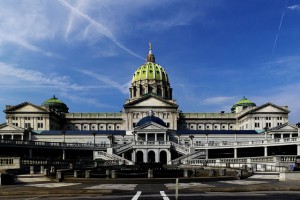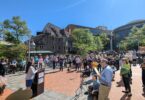By Michael Carroll | From Watchdog.org
Many Pennsylvania homeowners and state lawmakers are now sounding the drumbeat to eliminate the school property tax, which they say is overburdening senior citizens and has been rising precipitously in recent years.
Sen. David G. Argall, a Republican from Schuylkill County, has proposed Senate Bill 76, which would eliminate the school property tax and make up the funding difference through a 1 percent increase in the sales tax and a hike in the personal income tax from 3.07 percent to 4.95 percent.
“Property owners would no longer rent their homes from school districts,” Argall’s spokesman, Jon Hopcraft, told Watchdog.org in an email. “The school property tax is the fastest growing tax in the state and not at all based on one’s ability to pay.”
Legislation to kill the school property tax narrowly went down to defeat two years ago when the lieutenant governor broke a 24-24 vote in the state Senate by voting against the plan.
“No one anticipated we would be that close,” Hopcraft said, “but that shows how much the people of Pennsylvania hate the school property tax.”
The legislature has attempted to tweak the tax over the past 20 years or so, but calls for its elimination continue to grow, he said. In 2011, Argall heard from residents who wanted to eliminate the tax and put in place a reform plan that had the support of more than 80 taxpayer groups from around the state, according to Hopcraft.
“It is truly the only tax that has the power to leave one homeless,” he said.
Argall and representatives of the Pennsylvania Independent Fiscal Office, which analyzes proposals but does not make policy recommendations, have been giving presentations about the potential effects of such a tax shift.
Among the groups sponsoring their presentations is the Pennsylvania Economy League, a nonpartisan public policy think tank. League spokeswoman Lynn Shedlock said the organization has not advocated a position on the tax proposal but is making sure people are informed about it.
“Our role is more to educate people on these policy objectives,” Shedlock told Watchdog.org.
The Independent Fiscal Office has crunched the numbers relating to the possible tax shift and is presenting them to audiences in different parts of Pennsylvania.
“There have been efforts to do this over the last 15 years or so,” Matthew Knittel, director of the Independent Fiscal Office, said.
An overview of possible school district property tax reform proposals created by Knittel’s agency indicates that demographic changes in the state are creating challenges for policymakers. Some seniors are outliving their savings accounts as life spans increase, the report said, and the over-65 population in Pennsylvania will rise 31 percent through 2025.
In turn, some seniors have struggled to pay their property tax bills as they have aged, Knittel said. Reducing or eliminating the school property tax would reduce their burden, though the tax burden on renters would likely go up, he said.
“For homeowners, we think for most of them, in particular for those who are retired, it would be a significant tax cut,” Knittel said.
But he stressed that’s it’s unclear if such a tax reform would pass the legislature this year, since lawmakers are also working to close a $1 billion shortfall in the state budget.
“For the next few months, what will dominate the time for the General Assembly is probably budget issues,” Knittel said.
And just how different segments of the population would be affected by such a tax will depend on housing markets, income levels and school enrollment fluctuations, he said.
“Across the state, the conditions are going to vary greatly,” Knittel said.
Some business groups have expressed concerns about the concept of eliminating the school property tax. The Pennsylvania Chamber of Commerce has released position statements opposing SB 76 over the last few years, arguing that some business owners who lease their property could face rising tax burdens as the result of such a shift.
A sales tax increase would also boost the cost of products overall, potentially hurting small businesses’ profit margins, according to the chamber. And sales tax revenues might not be a dependable replacement for the property tax because they can fluctuate significantly relative to the strength of the state economy, the chamber said.
But Sen. Argall and others continue to press for a change.
“I think this issue has gained more traction in the last few years than ever in its history,” Hopcraft said. “It used to be a regional issue, but any public survey of the entire state shows the property tax as one of the top issues for Pennsylvanians.”









